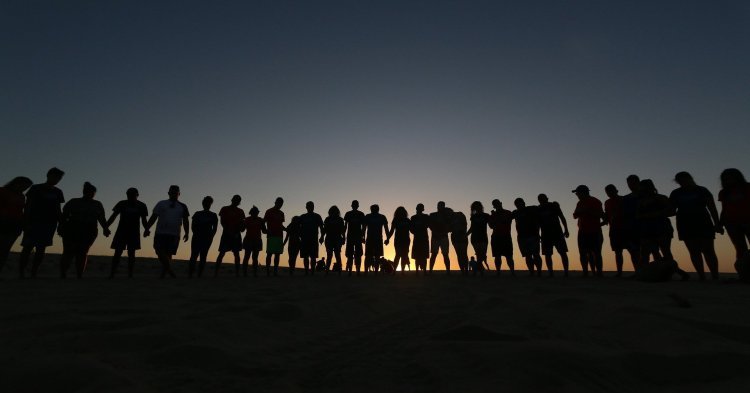Grounded in 2006 - the same year of the Democracy Under Pressure campaign kick-off - the World Justice Project is the most effective organization in the field of information about, and promotion of, the rule of law worldwide. The research and surveys it carries out, directly involving civil society, allow the organization to publish on a yearly basis a so-called ‘Rule of Law Index’. The results, clearer than any other report issued by the press, are often concerning.
All of the chapters of human history have at least one fil rouge or common thread: people that were capable of dreaming/imagining. If you think about that, evolution has always been bound to this skill: there has always been those who imagined small ideas and who dreamt big, those whose names got lost across time, and those who became legendary. Every history had its dreamers, and it is because of them we have the world we are currently living in. There is no need to go back several centuries to meet Charles de Montesquieu, the philosophers, historians and political activists who imagined a world in which not the King, but the citizens would have had a say on their lives and destinies. A world in which the three powers would not have overlapped, in which certain rights and freedoms would have been intangible, inviolable, fundamental. Thanks to the imagination of these thinkers, humanity was gifted, with each new event, with the phenomenon known as Rule of law.
And yet, when we hear or read about it nowadays, it is rarely as reinforcement of its values, of human dignity, democracy, equality and solidarity. On the contrary, the topic is raised due to the infringement of one or more of these values by a nation state. And we are not always talking about younger States, pleading they had not experienced first-hand the thoughts and works of the aforementioned thinkers. The States guilty of such breaches are often our neighbors, or states we share a common roof with, that of the twelve stars aimed at representing the very values of humanity, peace and harmony. Should we worry about not heading in the right direction?
The World Justice Project
The answer is quickly provided by the World Justice Project, organization born from the idea of William H. Neukom, with the support of 21 strategic partners, as the presidential initiative of the American Bar Association (ABA). Neukom imagined a system capable of creating knowledge and awareness about the rule of law worldwide, while at the same time triggering actions to promote it wherever obvious gaps were spotted. It was the year 2006, the same year when JEF Europe launched the first edition of its Democracy Under Pressure campaign, aimed at condemning democracy and human rights violations. The campaign was linked solely to Belarus back then, the country that was considered to be ‘the last dictatorship in Europe’. If we have a look at the information collected by the WJP, it becomes evident this myth is not entirely true.
Rule of law was traditionally considered as the domain of legal practitioners and courts. Everyday matters of safety, rights, governance are, however, concerning us all. Everyone is a stakeholder of the Rule of law, as stated on the organization’s website, opening the Rule of Law Index, a yearly ranking of 139 Countries, scored by level of freedom and rights, based on eight factors of the rule of law: Constraints on Government Powers, Absence of Corruption, Open Government, Fundamental Rights, Order and Security, Regulatory Enforcement, Civil Justice, and Criminal Justice. Data is collected through surveys directly involving the civil society, so that they are influenced in the least possible measure by people in power and media outlets’ political beliefs or nationalism disguised as patriotism.
In the last six years Nordic Countries (Norway, Denmark, Finland, Sweden) have steadily positioned themselves at the top of the ranking, occasionally taking turns on the top step of the podium, but others have been on the roller coaster the whole time. If we take a look at Europe, in the last couple of years France fell back six places, moving from 17th to 23rd place. Strong contributor of this decline was surely the introduction of the law that criminalises publishing with malicious intent any pictures of videos where the Gendarmerie is involved in public order interventions. The law appears to be compromising the freedom of press and speech. As a matter of fact, if we examine the fundamental rights category only, France ranks at the 32nd place, third to last among the European Union Countries. Italy, after years of swaying among the last three positions of the top 30, today ranks 34th. Besides the level of corruption which is still comparable to the one of Bahamas and Saint Lucia, Italy is impacted by an overly bureaucratic judicial system and a not very effective prison system that often appears to be not only counter-productive but also violating human rights (see, as an example, the torturing at Santa Maria Capua Vetere Prison). As a consequence, the Bel Paese ranks only 2 positions above the much dreaded Poland, that makes no secret of its violations of the rule of law - starting from government influence over the judiciary to the ban on abortion, to the LGBT+ free zones - which resulted in heavy sanctions imposed by Brussels, including the suspension from the Next Generation EU funds.
Belarus, Europe, and the Rule of Law
Belarus, currently ranking 97th, was until 2020 - not too obviously, if we consider Greece’s decline - holding the place of today’s European Union’s tail-end Country, Hungary. 69th, quite mid-table, halfway between Denmark and Venezuela. Over the years the survey has widened its scope, including other countries - some of which debuted at the bottom of the ranking demonstrating that they had at least the minimum transparency requirements needed to be included, such as Mozambico, Mauritania and Haiti. If we take this into account, what differentiates the last European dictatorship from the Country led by Viktor Orbán? Similarly, what makes it different from European Union Candidate States that plunged 20 (Serbia and North Macedonia) or 30 (Albania and Turkey) positions over the last six years?
Belarus is de facto a totalitarian regime. Since 1994, year of the last elections regarded as legitimate, President Alyaksandr Lukashenka slowly but steadily took over all the powers of the so-called Republic, imposing his law, censoring political opponents and striving not to give up Minsk’s higher seat. Lukashenka has even gone as far as to exclude - for reasons that it would be exaggerated to describe as woolly - ten candidates to the 2020 presidential elections, which he won again either due to a sudden epiphany of the 60% of voters or thanks to blatant electoral fraud. The other aforementioned countries have not gone this far, and are not qualifying as dictatorships, but might be going down that path. All of them began with some borderline constitutional reform followed by a more or less explicit overlap of powers. After reaching that point, each country went on with the preferred approach, some spying on its citizens, some oppressing media outlets, political opponents, or minorities.
For every action, there is an equal and opposite reaction, and to each rule of law infringement, the World Justice Project replies with an immediate reaction. This is the main reason why it is being strictly monitored, especially by the European Union. Brussels is able to and has to show to its 27 member States, and those aiming at becoming part of it, the path that needs to be taken. It is certainly true that each chapter of the acquis holds the same importance, but the greatest attention should be paid to the 23rd, dedicated to judiciary and fundamental rights, and the 24th, on justice, freedom and safety. It is inconceivable that a EU or a candidate country, as cutting-edge as it can be in terms of labour system, in the field of research or environmental protection, falls under the minimum threshold of even only one of the Rule of Law Index categories.
It is actually inconceivable that any country, in 2022, falls under the minimum level threshold of even only one of the Rule of Law Index categories. This is proof that we are not heading in the right direction and that we are losing the skill of imagining a better future. We, as these dilemmas require an answer from humankind, be it Danes, Venezuelans, Europeans, Americans or Asians. Even though you feel absolved, you are involved.


Follow the comments: |
|
